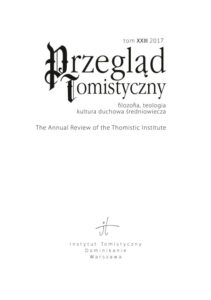DAMIAN MRUGALSKI OP, The Infinity of God in Novatian: Probable Greek Sources

Tom XXIII: 2017
Filozofia — Teologia— Kultura duchowa średniowiecza
ISSN 0860-0015
e-ISSN 2544-1000
SUMMARY
At the end of the 19th century, Adolf von Harnack asserted the thesis that the Roman theologian Novatian wrote his De Trinitate under the strong influence of the doctrine of Tertullian of Carthage. Furthermore, he said that it was difficult to find any influences of Platonic thought in Novatian. Numerous studies of the philosophy of Middle Platonism conducted in the second half of the 20th century have, however, contributed to a new perspective on the sources of thought of several Christian authors, including Novatian. The Middle Platonists did not attempt to faithfully reconstruct Plato’s philosophical system, but they rather inserted theses from various doctrines, including Aristotelian and Stoic, in their Platonic commentaries and textbooks. Based on new research, many of today’s thinkers have begun to point to possible Middle Platonic sources for De Trinitate. They have noted, for instance, that although Novatian uses stoic language inherited from Tertullian, he speaks of a transcendent and non-corporeal God, just as Plato and the Middle Platonists did. The latter, however, did not accept the concept of the infinity of God, since the infinite seemed to them unfinished and therefore imperfect. The concept of a transcendent, infinite and unknowable God appears in the Jewish and Christian theologians from Alexandria like Philo, Clement and Origen. The purpose of this article is to show the similarities and parallels that occur between the theology of Novatian and the Alexandrian theology of the first three centuries CE. The results of these studies confirm my thesis, stated in my previous article, that Plotinus was not the first thinker to develop the doctrine of the positive infinity of God, but that this thesis appeared as soon as Greek philosophy encountered the Bible. Regardless of whether Novatian was in fact able to read the actual works of the Alexandrian theologians (and the similarities between their doctrines are many), this article shows that, in the Western Roman Empire in the days before Porphyry edited the Enneads of Plotinus, Christian thinkers employed the concept of the infinity of God and drew important ontological and epistemological conclusions from this concept.
